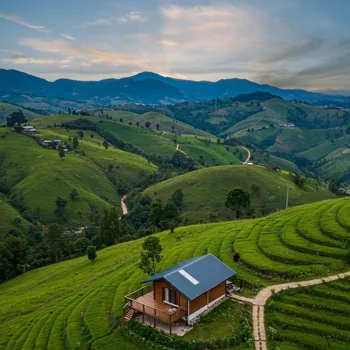Discover 10 Ways to Eco-Friendly Travel in India: 'Atithi Devo Bhava' - Respect Earth and Explore Responsibly!
Namaste, wanderers! Feeling that travel bug bite? India is calling, with its majestic Himalayas,
serene backwaters, and vibrant cities. But before you pack your bags, let's talk about doing our bit for Mother Earth while we explore.
'Atithi Devo Bhava' – our guests are like gods, but let's also treat nature with the same reverence. Here are ten simple yet effective ways to make your Indian adventures greener. So, get ready to explore responsibly and leave only footprints (and take only memories!).
Pack Light, Travel Bright:
Seriously, folks, do you really need that extra pair of shoes? Every kilogram counts! Lighter luggage means less fuel consumption for planes, trains and automobiles. Think multi-functional clothing items – a shawl that doubles as a blanket, a pair of trousers that can be rolled up into capris.

Plan your outfits, use travel sizes for toiletries (or better yet, refillable containers!), and leave the "just in case" items at home. Your back and the planet will thank you. Plus you will also save on baggage charges. Packing lighter also means buying less souvenirs that are not sustainable.
Choose Your Transport Wisely:
While flying might seem like the fastest route, it's often the least eco-friendly. Consider trains for longer distances. Indian Railways is a vast network, and traveling by train is an experience in itself, offering glimpses of rural life and breathtaking landscapes.
For shorter trips, opt for buses or shared autos. Within cities, walk, cycle, or use public transport like metros whenever possible. If you have to rent a car, choose fuel-efficient models or even consider electric vehicles, which are becoming increasingly available in major cities in India.
Don't just zoom past the beauty via flight. Embrace them by travelling on land and experience that connect with your country.
Embrace Sustainable Accommodation:
Look beyond the star ratings and delve into the environmental practices of your hotels or guesthouses. Do they have solar panels? Do they use water conservation techniques? Do they support local communities?

Many eco-friendly accommodations in India are popping up now-a-days that use sustainable materials, have committed to reducing waste, and employ local staff. Search for eco-lodges, homestays, or hotels that are certified for their sustainability efforts.
And even if your hotel isn't fully "green," you can still do your part by reusing towels and linens, turning off lights and AC when you leave the room, and conserving water.
Say No to Plastic (As Much As Possible):
Plastic pollution is a huge problem in India, as it is everywhere. Be a responsible tourist and ditch the single-use plastics. Carry your own reusable water bottle and refill it whenever possible. Many establishments now offer water refills.
Bring your own reusable shopping bags, keep a set of reusable cutlery and plate, and politely refuse plastic straws and cutlery when you order food. Say "no, thank you" politely but firmly. Try to buy products that minimise packaging. Think about the impact of every purchase that you make.
You don't want to add to that already existing mountain of trash!
Support Local Businesses and Communities:
Instead of patronizing large chain stores and restaurants, choose local businesses and vendors. Buy handicrafts directly from artisans, eat at family-run restaurants, and stay in locally owned guesthouses. This not only supports the local economy but also gives you an authentic cultural experience.

When you buy local, you are also reducing carbon footprint, as the goods are not being transported from far. Plus, you'll often find unique and handmade souvenirs that are much more special than mass-produced items.
Supporting the community will ensure the community is empowered to protect the local environemnt.
Respect Local Culture and Traditions:
Remember you are a guest in someone else’s home. Be mindful of local customs and traditions. Dress modestly when visiting religious sites, ask for permission before taking photographs of people, and learn a few basic phrases in the local language.
Respecting local culture shows that you appreciate their heritage and are not just there to consume their resources. Avoid actions that are considered disrespectful or disruptive like loud noises. Embrace the 'Indian' way and learn! Observe and adapt.
Respectful tourism fosters positive relationships and helps preserve cultural heritage for future generations.
AI Generated Content. Glance/InMobi shall have no liability for the content












